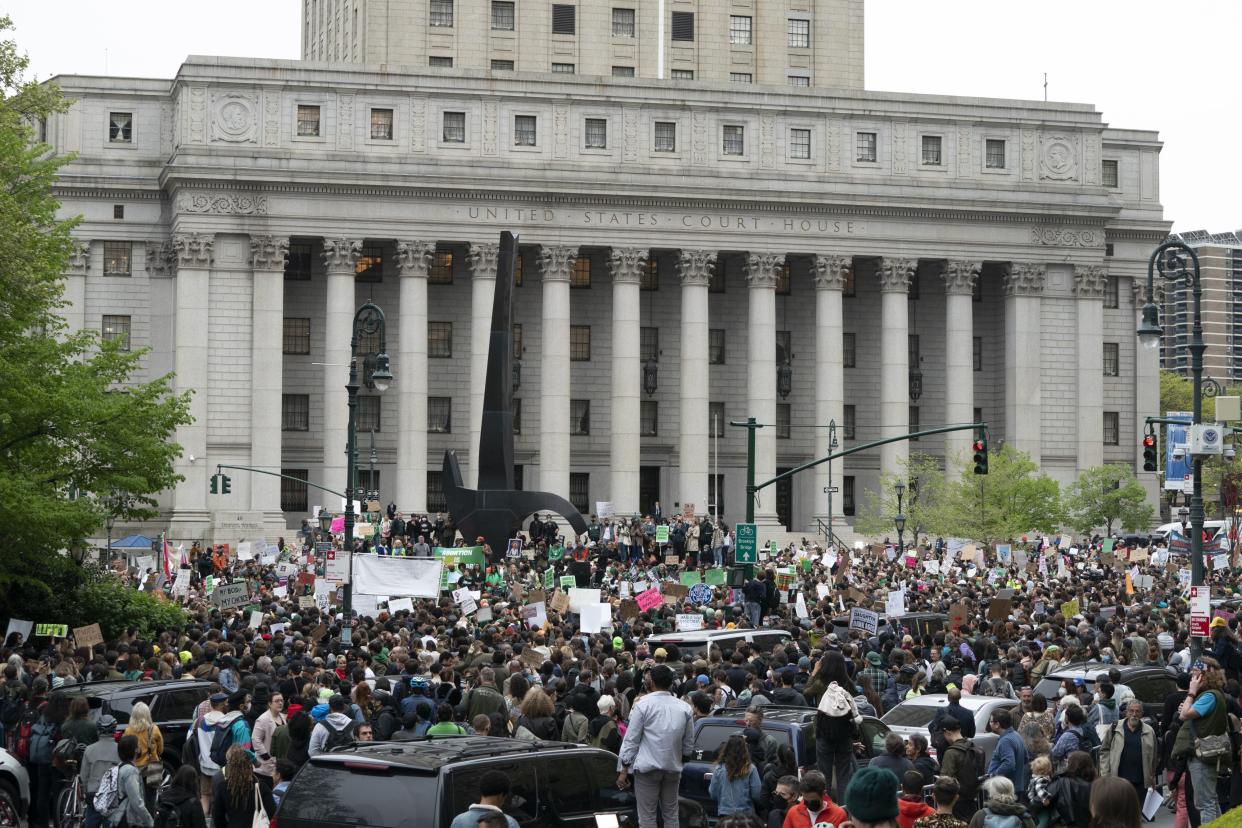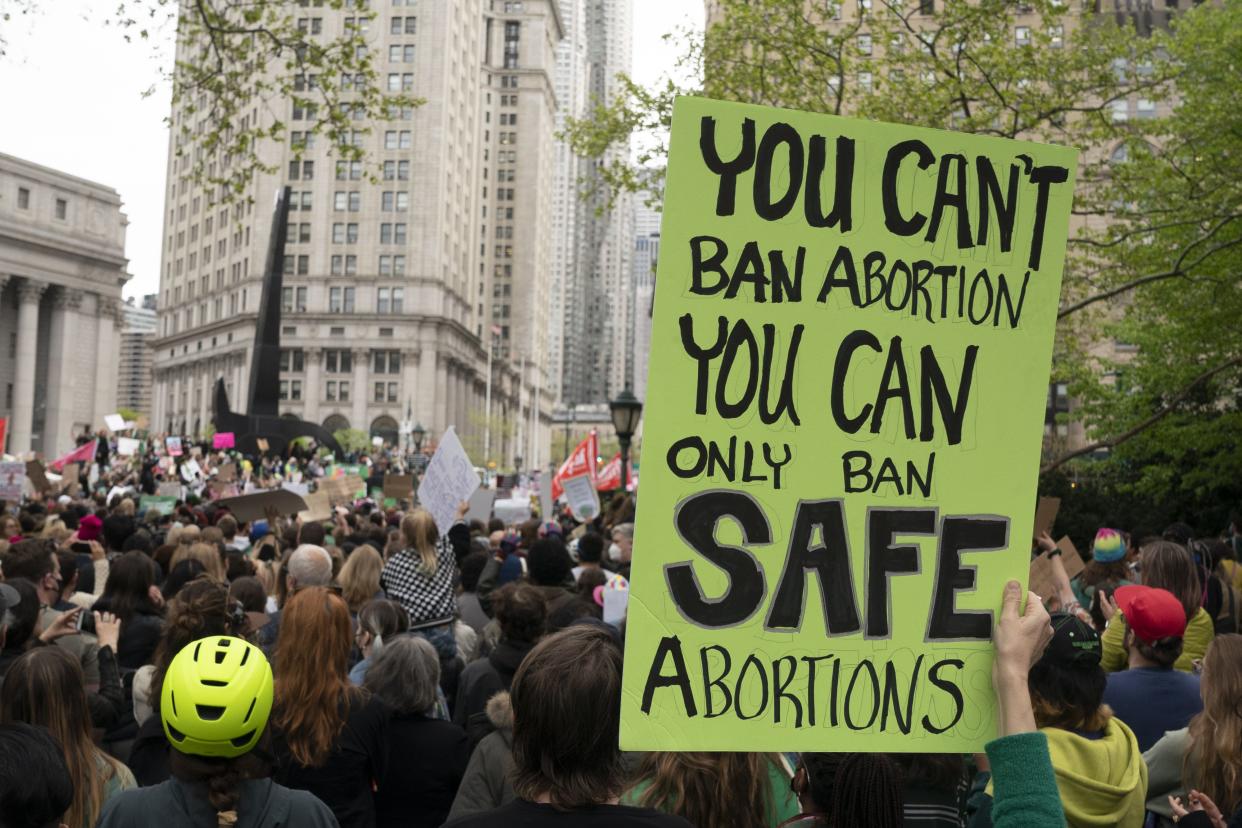What would it mean for New York if Roe v. Wade is overturned?
The Supreme Court’s conservative majority has voted to eliminate the constitutional right to abortion, according to a February draft opinion in a Mississippi case that leaked on Monday.
Leaked draft of Supreme Court opinion strikes down Roe v. Wade abortion case
The ruling, if finalized without major changes, would not have an instant legal impact in New York, home to some of the most robust reproductive rights in the country. But it would reverberate swiftly in other states, and could lead to local changes to bolster New York’s status as a safe harbor.
The decision is expected in June or July.

The Supreme Court has stressed that the opinion is not final, and could be tweaked. But Americans have already begun to brace themselves for the fall of Roe v. Wade, the 49-year-old ruling that secured federal abortion rights.
Here is a look at some pressing questions New Yorkers may have on their minds ahead of a decision that would have staggering impacts on the nation’s politics — and health care access for millions of women.
What are New York’s reproductive protections?
In 2019, New York lawmakers codified Roe’s protections into the state law, passing the Reproductive Health Act, which was signed into law by former Gov. Andrew Cuomo.
The law, a response to efforts by President Donald Trump to overturn Roe, removed abortion from the state criminal code and enshrined it as a right in health law. It also carved out situations in which New Yorkers can receive abortions after 24 weeks of pregnancy: If a fetus is not viable, or if the procedure is necessary to protect a patient’s health. Most pregnancies last 37 to 42 weeks.
New York passes Reproductive Health Act [2019]
Public hospitals in New York offer abortions. The state first legalized abortion in 1970, and tens of thousands flocked to New York over the following two years, according to official estimates. Even today, many teenagers come to New York to receive abortions, because some states have restricted access for girls under 18. Teens under the age of 18 can legally access abortions in New York without the consent of their parents.
Responding to the draft leak, Gov. Hochul said Tuesday that “in the State of New York, we will not stand idly by. Anyone who needs care, we welcome you with open arms.”
“We believe that access to reproductive health is a human right,” Hochul said at an Albany news conference.
Can people from other states get abortions in New York?
Yes, out-of-staters can receive abortions in New York. According to data from the Centers for Disease Control and Prevention, about 9% of recorded abortions in New York State in 2019 involved out-of-state patients, though the figures may be incomplete.
But because New York sits in a cluster of states with strong abortion protections, poor pregnant women and teens seeking safe haven may struggle to reach New York.
In December, as Supreme Court conservatives signaled at oral arguments that they were open to striking down Roe, New York’s attorney general, Letitia James, floated the idea of helping abortion seekers from other states by covering their travel and abortion costs.
Democratic outrage follows leak of draft decision overturning Roe v. Wade: ‘Abomination’
It appeared that such a plan would likely need to be hammered out in the state Legislature, and James’ office did not provide a timeline for such a plan.
Hochul did not publicly commit to pursuing James’ proposal. But on Tuesday, she promised the state will play “offense.”
“My message to women all across this country is that New York, the State of New York, will always be there for anyone who needs reproductive health care, including an abortion,” the governor said.
Hochul said executive and legislative actions were forthcoming.
The Brigid Alliance, a New York nonprofit, helps cover costs of travel for abortion services.
What else are New York politicians doing in response to the draft ruling?
State Sen. Liz Kreuger, a Manhattan Democrat who sponsored the state’s 2019 law, is now sponsoring legislation, introduced early in the spring, that would prevent law enforcement from cooperating with out-of-state probes into New York doctors who provide legal abortions in the state.
State Sen. Alessandra Biaggi, a Democrat representing the Bronx and Westchester, reintroduced a bill in January that would create an abortion access fund that taxpayers could choose to pay into.
Chuck Schumer, the Brooklyn Democrat and U.S. Senate majority leader, has said he hopes to call a vote next week on federal legislation to codify Roe into law.
But will the federal government pass a law to enshrine reproductive rights?
Schumer has called the draft ruling an “abomination.” But his tools to preempt the fall of abortion protections through legislation appear limited. The House voted in September to approve a bill that would secure a national right to abortion, but Democrats appear to lack votes in the evenly split Senate to do the same.

Still, Schumer told the Daily News on Tuesday night that “every senator will have to show their position on keeping Roe v. Wade before every American.”
Even if Schumer gets the vote he craves, it is all but certain it would not pass. Instead, federal abortion rights could land on the ballot in the midterm elections in November.
